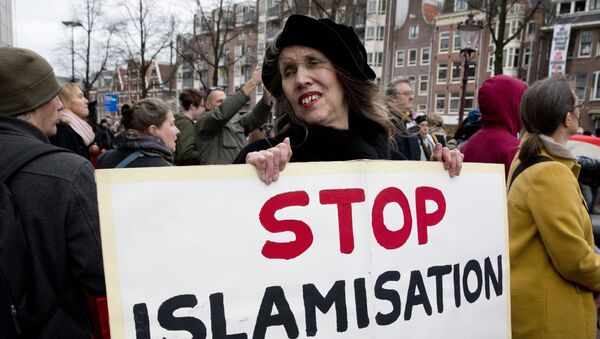According to the survey conducted by Hungarian think tank the Szazadveg Foundation, 70 percent of respondents believed that an increased in Muslim immigration into Europe was a serious threat to the continent, while 86 percent said they thought a terrorist attack was likely in their country.
The foundation contacted 1,000 people in all 28 EU member states, and although the research was undertaken in April, the publication of the results were delayed until after Britain's referendum on EU membership.
#Europe's only hope against Caliphate #terrorism is to completely end the #EU. Nations need their own sovereign borders. #Immigration #Fail
— Taylor Pearl (@PearlzJam) June 29, 2016
In an indictment of the EU's approach to the migration crisis, the foundation said that most European citizens believed "the immigration wave increases the risk of terrorism, the number of criminal activities, and imposes risk on the cultural integrity of the countries that are impacted by it."
More than three-quarters (77 percent) of those surveyed said they didn't think the EU was adequately addressing the migration crisis while 83 percent said Brussels should do more to strengthen the bloc's external borders.
I think the global rise in #Terrorism in recent months has made people #fear #immigration and this is what has lead to #brexit #eu #istanbul
— Lee Scott (@LeeScott1981) June 29, 2016
The issue of immigration, and in particular the wave of refugees and migrants coming from the Middle East, has been an issue of fierce debate in Europe over the past couple of years with more than one million people arriving in the EU last year alone.
The influx in immigration resulted in a surge in anti-immigration rhetoric and the rise in political parties pledging to control immigration.
While the European Commission, along with countries like Germany, supported moves to introduce a refugee quota system to help manage the migration crisis, a number of member states rejected the idea, with Poland, Hungary, Slovakia and the Czech Republic among the most vocal critics.
Strange, the UK's reaction to refugees and immigration is influence by terrorism.Leaving the EU and creating divisions is what they wanted
— Wuj Wuj (@WaseelahSmedley) June 28, 2016
Andras Lanczi, professor of Corvinus University in Budapest and former chairman of the Szazadveg Foundation, said the findings show that "the split has never been so large between ruling elites and the grassroots."
Despite respondents being unhappy with the actions of the EU in relation to certain issues, the survey revealed that most European citizens do not want their countries to leave the bloc, with 64 percent saying they would not sign a petition calling on their country to exit the EU.


